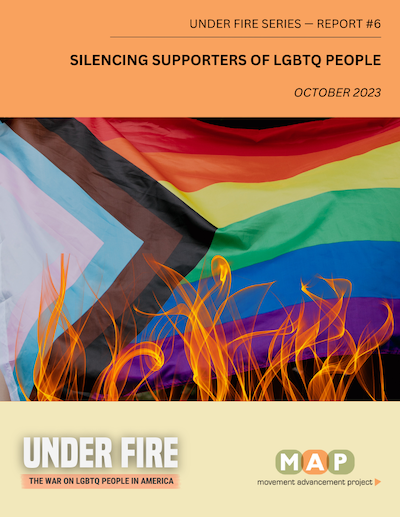The Surge in Efforts to Silence and Punish Supporters of LGBTQ Equality
Boycotts, Criminal Penalties, Harassment, and Violence Seek to Silence Supporters of LGBTQ People
MEDIA CONTACT: Rebecca Farmer, Movement Advancement Project
rebecca@mapresearch.org | 303-578-4600 ext 122
October 17, 2023
Opponents of LGBTQ equality have dramatically increased their efforts to silence and punish supporters of LGBTQ people, according to a report released today by the Movement Advancement Project (MAP). The report, Silencing Supporters of LGBTQ People, is the final in MAP’s report series, Under Fire: The War on LGBTQ People in America.
“Americans support LGBTQ equality. Our opponents know this. That’s why they are working to create the false perception of lower support by scaring people into silence,” said Naomi Goldberg, Deputy Director and LGBTQ Program Director at MAP. “Their attempts to bully, fine, and punish virtually anyone who supports LGBTQ people is just one tactic in their larger strategy. As our report series makes clear, their ultimate goal is to keep LGBTQ people from being able to live openly and participate in daily life.”
State legislatures introduced more than 725 anti-LGBTQ bills this year alone – shattering previous records. Many of these bills introduce a range of penalties for supporters of LGBTQ people. This final report in the Under Fire series from MAP identifies three core tactics opponents are using in their attempts to silence supporters of LGBTQ people:
Tactic 1: Creating criminal and professional penalties for supporting LGBTQ people.
Penalties such as these are on the rise and are intended to make it too risky to continue supporting LGBTQ people or opposing harmful laws. These penalties include the following approaches:
Targeting health providers: Recent bills primarily target medical providers through steep fines, potential lawsuits and even revoking a doctor’s medical license – all for simply providing best practice medical care that is supported by major medical associations. Five states have gone even further, making it a felony crime to provide best practice medical care to transgender youth.
Targeting parents and families: In a number of bills, families supporting their transgender child could face criminal charges or be investigated for child abuse. In 2022, the Texas attorney general and governor ordered investigations of families with a transgender child. This year Florida passed a law potentially allowing the state to take custody of a transgender child or their siblings. The Florida law applies to anyone visiting the state, such as a family on vacation to Disney World.
Targeting schools and libraries: Teachers who refuse to censor discussions of LGBTQ issues could lose their jobs, be fined, or face jail time in several states. In 2023, close to half of states introduced bills about the use of pronouns at school, including bills that could make it illegal for schools to use accurate pronouns and names for transgender students. Libraries that refuse to remove LGBTQ books could have public funding cut.
Targeting legislators: In Montana, Oklahoma, and Nebraska, lawmakers were censured, not permitted on the floor, or had ethics investigations launched all for speaking out against harmful anti-LGBTQ legislation.
Tactic 2: Attacking companies that support LGBTQ people and voice opposition to anti-LGBTQ policies.
Anti-LGBTQ lawmakers are even working to reshape how private businesses do their work, both as employers and as supporters of LGBTQ equality. Among their methods: 
Limiting or banning how companies can advance inclusion among their employees. Florida, for example, has made it illegal for companies to require employees to attend certain trainings.
Limiting the ability of public colleges and universities to teach about, facilitate, and promote inclusion and diversity on campus. For example, this year Florida passed a law banning public colleges from spending money on diversity, equity, and inclusion programs. Additionally, Texas bans offices focused on diversity on college campuses.
Boycotting companies that support LGBTQ people. Viral social media campaigns have turned into coordinated efforts to penalize businesses with LGBTQ Pride Month products and businesses with transgender influencers in their advertising efforts.
Stripping preferential status from certain businesses that speak out against harmful legislation. Most notably, Florida stripped Disney of its unique status after the company spoke out against harmful school censorship legislation.
Tactic 3: Stoking violence and harassment.
Harmful rhetoric created by anti-LGBTQ legislation has resulted in violence and harassment. This broader climate can have a chilling effect on supporters who may fear for their safety. Violence and harassment have been stoked in some of the following ways:
Dangerous rhetoric about supporters of LGBTQ people: Supporters of LGBTQ people are called “groomers,” reflecting a revival of a decades-old tactic used against LGBTQ people.
Acts of violence against allies: In a shocking recent example, a small business owner in California was murdered in 2023 after the shooter took issue with her flying the LGBTQ Pride flag.
Threats and harassment: In a 2022 survey of LGBTQ community centers, more than seven in ten indicated they’d received threats or other forms of harassment. And in Missouri, where over 50 anti-LGBTQ bills were introduced in 2023 alone, at least three different LGBTQ bars in the St. Louis area received bomb and shooting threats. As of a December 2022 report, at least 24 different hospitals and providers across at least 21 states were directly targeted by coordinated online harassment campaigns.
“This year, through our Under Fire series, we’ve sought to draw attention to the increasing, coordinated, creative, and cruel anti-LGBTQ attacks over the past few years. Their goals are clear; so must our courage be to push back against them.”
###
MAP's mission is to provide independent and rigorous research, insight and communications that help speed equality and opportunity for all. MAP works to ensure that all people have a fair chance to pursue health and happiness, earn a living, take care of the ones they love, be safe in their communities, and participate in civic life.


